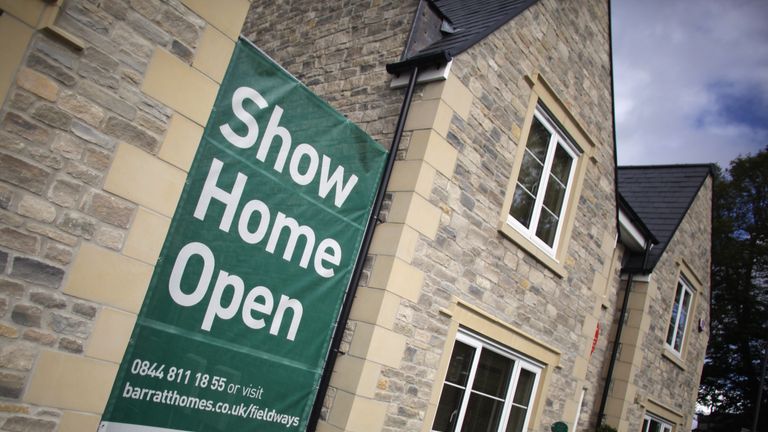
Campaigner Positive Money calls the scheme a "subsidy for a housing bubble" that benefited developers and existing home owners.
A third of home buyers who used the Help to Buy scheme last year could have purchased a property without the initiative, research by a government spending watchdog has revealed.
According to the National Audit Office (NAO), 31% of the 211,000 buyers who used the equity loan scheme by December 2018 could have purchased a home anyway.
The government spending watchdog also said that around 4% of buyers that used the scheme - which is not means tested - had household incomes of over £100,000.
Over the whole scheme, 10% of buyers had household incomes of over £80,000, or over £90,000 in London.
The research also found that 37% of households would not have been able to purchase a property without Help to Buy, but that the scheme had also benefited large developers.
According to the NAO's analysis, five companies - Redrow, Bellway, Taylor Wimpey, Barratt and Persimmon - accounted for just over half the sales made across England with the scheme's support between 2013 and 2018.
Redrow made up 3.7% of sales, Bellway accounted for 6.7%, Taylor Wimpey 11.9%, Barratt 13.3% and Persimmon 14.8%.
Larger firms tended to be better equipped to administer the scheme, the report said.
The scheme was set up in April 2013 by the then Department for Communities and Local Government.
The NAO said it was too early to tell whether the initiative had provided value for money, but added that the government's challenge now was to wean the property market off the scheme.
Home buyers receive an equity loan of up to 20% (or 40% in London) of the market value of a new-build property.

Barratt is one of five major developers that benefited most from Buy to Let sales
They are not charged loan fees for the first five years of owning their home.
Take-up of the scheme had been lower in London, where average house price-to-earnings ratios were higher, compared with the rest of England, the NAO's report said.
Commenting on the report, Fran Boait, executive director of campaigning body Positive Money, said: "It's now beyond clear that rather than helping those who can't afford to buy a home, Help to Buy has mainly been a subsidy for a housing bubble, benefiting property developers and existing home owners."
By 2023, the net amount loaned through the scheme is forecast to peak at around £25bn, with the investment expected to be recovered by 2031-32 and a positive return made overall.
But the NAO said the investment was exposed to significant market risk, as it was sensitive to house price changes and the timing of buyers repaying loans.
It said there was also a cost in terms of opportunity in tying up money for a considerable period, rendering it unavailable for other housing schemes or priorities.
Gareth Davies, head of the NAO, said: "Help to Buy has increased home ownership and housing supply, particularly for first-time buyers.
"However, a proportion of participants could have afforded to buy a home without the government's help.
"The scheme has also exposed the government to significant market risk if property values fall, as well as tying up a significant public financial capacity.
"The government's greatest challenge now is to wean the property market off the scheme with as little impact as possible on its ambition of creating 300,000 homes a year from the mid-2020s.
"Until we can observe its longer-term effects on the property market and whether the department has recovered its substantial investment, we cannot say whether the scheme has delivered value for money."
A spokesman for the Home Builders Federation (HBF) said: "Help to Buy has been central to supporting new-build sales rates, and thus the construction of desperately needed homes, while the wider second-hand market has remained sluggish.
"At present, the mortgage market is not equipped to support realistic lending to first-time buyers purchasing in the new-build sector."
Housing Minister Kit Malthouse said: "Help to Buy has been genuinely life changing for first-time buyers across the country, helping them secure their first step on the property ladder."
He said: "From 2021 the scheme will be extended and strengthened to make it exclusively for first-time buyers to support those who need it most."









Leave a comment